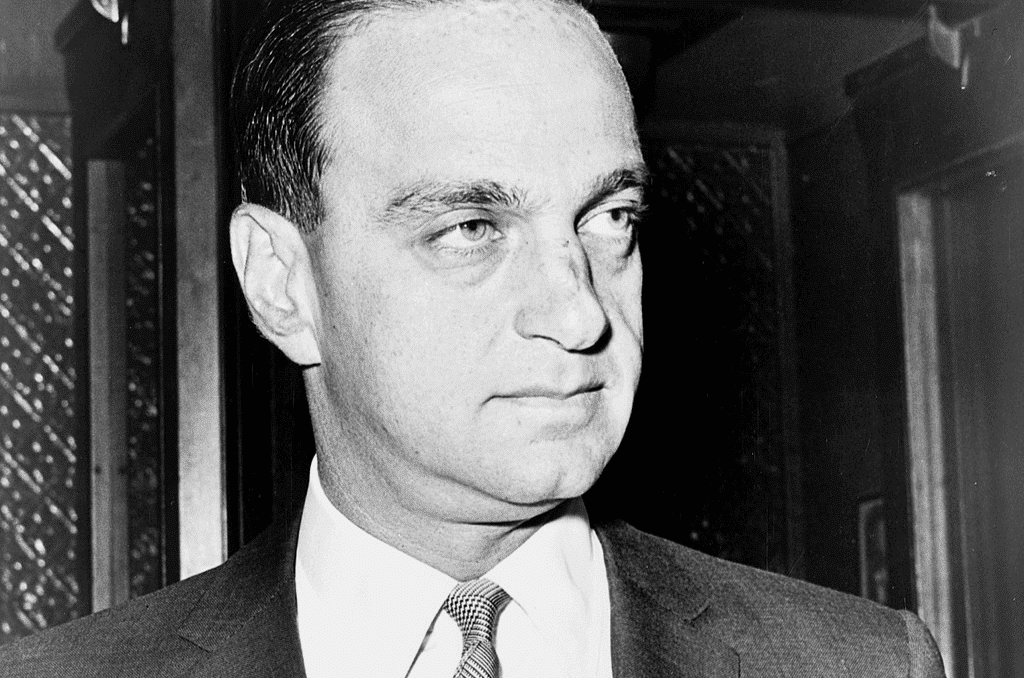In the film The Apprentice, directed by Ali Abbassi, he is supposed to be a secondary character. But in reality, he is the protagonist in the rise of Donald Trump. Heir to a vast real estate empire, Trump turned to entertainment and then politics, thanks to the advice of his mentor. A formidable and feared lawyer and prosecutor, Roy Cohn, like an evil pygmalion, shaped Trump, giving him the keys to the supreme office.
It’s often said that any individual is the sum of the five people he or she comes into contact with most on a daily basis.
Although Roy Cohn died in August 1986, it is undeniable that he played a major role in Donald Trump’s transformation into a real estate bulldozer in the late 1970s and mid-1980s. A transformation that would enable the politician with the blonde quiff to become the 45th President of the United States on November 9, 2016. The soundtrack to the film Air Force One by multi-award-winning composer Jerry Goldsmith (1997).
For the lawyer turned personal legal advisor to Donald Trump and his father not only terrorized the barons of New York politics: he also theorized the thinking on which the ex-president of the United States is based.
Disciple of McCarthyism
Trump’s sulphurous lawyer, Roy Cohn, was born in New York’s Bronx district in 1927, to a judge father and an intrusive mother. With the help of Favor Bank (a local influence peddling scheme), his father, a Bronx judge, made it to the New York Supreme Court. In the wake of the 1929 stock market crash,his visiting uncle was incarcerated for bank fraud in the notorious Sing Sing prison, located north of the city along the Hudson River.
With a law degree from Columbia University, Roy Cohn soon became anassistant U.S. attorney. He was not even 20 when he succeeded in securing the conviction and execution of the Rosenbergs in 1951, on suspicion of being Soviet spies. Determined to send Ethel Rosenberg to the electric chair along with her husband Julius, he convinced the latter’s brother, Paul Greenglass, to retract his statement and even used an illicit audio recording to obtain the death penalty for the couple.
But his real claim to fame came when he became the lead attorney – some in the media would even say “the brains” – of the infamous Wisconsin senator, Joseph McCarty. McCarty, determined to fight the Soviet enemy on American soil, embarked on a veritable purge against real or alleged government “communist sympathizers ”, right down to the biggest Hollywood studios.
Ironically, Roy Cohn may have been a homosexual in private, but he didn’t hesitate to persecute those who shared his sexual preferences by depriving them of their government jobs, during the so-called “Lavender Scare”.
A regular at Studio 54, a famous nightclub and drug haven – from its opening in the spring of 1977 to its closure for tax evasion by its owners in 1979 – he exerted his influence as a friend of stars such as Barbara Walters, Andy Warhol and the presidential couple Ronald and Nancy Reagan.
If Edward Bernays theorized about public relations, Roy Cohn excelled as a “Power Broker”, using his schemes and sprawling network to secure acquittals for his clients and himself. It was his custom not to demand money from his clients, preferring to demand unwavering loyalty.
Disbarred a few days before his death for client fraud,he denied until his last breath that he was homosexual, preferring to declare himself ill with liver cancer rather than the AIDS that would eventually claim his life.
Theorist of Trump’s Wishful Thinking
When Roy Cohn met Trump in the early 1970s, New York was rife with drug trafficking. The city was one of the least safe in the world, and the future wolf of politics was in his thirties. He and his father are sued by the federal government for discriminating against black tenants in their housing stock. It was Cohn who suggested that Trump counter the Justice Department, despite a case presenting damning evidence, in particular an annotation system associated with each rental file. The case was eventually settled using Roy Cohn’s usual methods, based largely on intimidation.
This first feat of arms for the Trumps earned him a position as Donald Trump’s personal legal advisor, before becoming a lawyer for the family’s global interests.
In Ali Abbassi’s film, Roy Cohn, played by Jeremy Strong, best known for his role as the cold-blooded, ambitious Kendall Roy in the Succession series, is masterful in this role of unscrupulous lawyer and prosecutor. Acting like a tutor, Roy Cohn takes the time to instill in Donald Trump three commandments, a kind of man-of-action breviary revisited from the dark side. In the film, they can be summed up as “attack attack attack ‘, ’never admit to anything, deny everything ‘ and ’no matter what happens, never admit defeat and always claim victory”.
Most important of all is probably the third and final rule, which embodies the “magical thinking” or “Wishful Thinking ” to which the former tenant of the White House is accustomed. A dominant “battant” way of thinking, particularly vivid in the 80s, whose vestiges can even be found in the eponymous song by the band Go West, which even features in the credits of the film Pretty Woman (although the film was released in 1990, it is indeed based on an eighties story).
Midas Touch or Faustian pact
While the reality is undoubtedly more complex, the film The Apprentice presents Roy Cohn as Donald Trump’s true pygmalion, transforming a harried but hesitant young man into a shark of real estate and then public relations in the broadest sense.
The author of the novel Fellow Travelers, featuring the character of Roy Cohn, Thomas Mallon, thus declared that the media had at the time of Donald Trump’s election “underestimated [Roy Cohn’s] vampiric role returned from beyond the grave thanks to Donald Trump. ”
Mike Reiss, screenwriter of the Simpsons animated series, had said he had been inspired by Roy Cohn to create the fearsome lawyer Mr. Burns, a kind of “inhuman drone” (without a name) who had become thearchetypal brown lawyer for the show. In the run-up to Donald Trump’s election, the Washington Post devoted an article to Roy Cohn’s influence on the Trump style, with the headline “The man who showed Donald Trump how to harness power and instill fear”.
The title of Ali Abbassi’s film is also a nod to the famous eponymous reality show first broadcast in January 2004 on NBC. In this TV show, which humorously sifts through the professional skills of the contestants, Donald Trump stands out with his laconic and merciless “You’re fired”. The show would have a far greater impact in the future, giving the future President unparalleled notoriety in the American mainstream.
But The Apprentice takes the approach of giving credit where credit is due. It suggests that the construction of Donald Trump’s identity and even ideology is not his own doing, but that of his “mentor”. The film makes it clear, however, that while the master shows the way, there comes a time when the apprentice surpasses the master.
Read also > Swing States once again at the heart of the US elections
Featured Photo: © Herman Hiller/World Telegram & Sun














